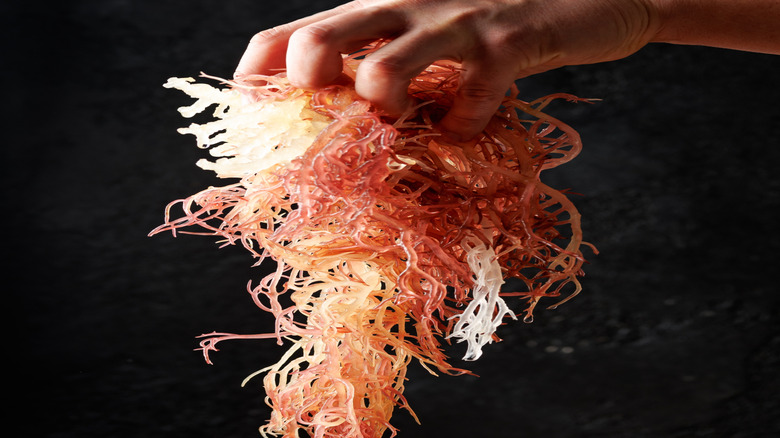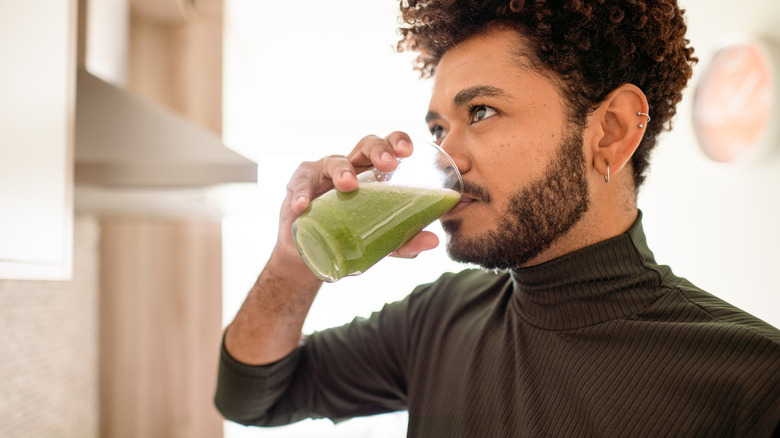A Vegetable That Grows In The Ocean Can Lower Cholesterol, Reduce Blood Sugar, And Prevent Cancer
When your parents advised you to "Eat your vegetables," you might have pictured ones traditionally harvested from the ground, like potatoes, carrots, and beans. However, some vegetables grow in seawater, including one that has shown promise for having cardioprotective, anticancer, and anti-diabetic capabilities.
Sometimes called Irish moss or red seaweed, sea moss has a red tinge to it and comes from Northern Atlantic waters. You've probably eaten one of its byproducts, a fiber called carrageenan, because it's a frequently used natural thickening agent. Or, you might have tried sea moss if you routinely consume seaweed (about 36% of people fall into that category, according to a Maine Aquaculture Innovation Center survey).
Sea moss offers plenty of nutrients, including calcium, iron, magnesium, and phosphorus. Many of these offer potential benefits if you're battling higher-than-average cholesterol, trying to control your blood sugar levels, or attempting to minimize your risk of cancer.
Fight cholesterol building with fiber
Many of the studies that support the potential advantages of consuming sea moss were performed on a different type of seaweed (or a variety of them). However, because sea moss is a type of seaweed, examining any seaweed's performance under rigorous scientific conditions is a reasonable approach to evaluating this food's health benefits.
Let's start with fiber. Though sea moss contains only 0.13 grams per two tablespoons, it's still what registered dietitian Bree Phillips described in The Strategist as "a good source of fiber." Only 5% of people in the United States achieve the recommended daily fiber intake, according to the American Society for Nutrition. Thus, adding sea moss to your diet can contribute toward reaching the total amount of fiber you should eat in a day.
Among the potential upsides of ensuring that your diet is rich in fiber: having reduced cholesterol levels. In a 2003 study in the Asia Pacific Journal of Clinical Nutrition, subjects who consumed carrageenan experienced a reduction in their total cholesterol readings, as well as an increase in their "good" high-density lipoprotein (HDL) cholesterol levels.
Potential for blood sugar management and cancer prevention
In terms of supporting healthier blood sugar levels, seaweed offered promise as a diabetic-friendly food in a 2008 study in Nutrition Research and Practice. The researchers discovered that taking 48 grams of seaweed a day made controlling glucose responses easier for the study participants, who also saw increases in their HDL cholesterol levels.
Meanwhile, the connection between sea moss and cancer reduction stems from the vegetable's antioxidants, which assist the body in pushing back against the damage caused by oxidative stress. A 2021 study in Carbohydrate Polymers determined that, at least in laboratory settings, the presence of antioxidants in sea moss might be able to stop the growth of certain cancer cells in test tube experiments. Though this is not definitive proof that sea moss prevents cancer, it hints at the vegetable's anticancer potential.
This doesn't mean you should reach for sea moss in lieu of getting healthcare advice. Your best bet to beat back rising cholesterol, pre-diabetes and diabetes, and cancer is to speak with a medical professional. That said, if you're looking for functional foods to augment your diet, you may want to take advantage of what sea moss can do for your health. Just be aware that, like all sea plants, sea moss can absorb aquatic toxins like metals. Additionally, those with inflammatory bowel syndrome may want to be wary of consuming carrageenan.


